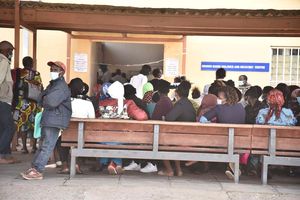Locked out: Civil servants pay for healthcare they cannot access

The Social Health Authority building in Nairobi.
Every month, 2.75 per cent of your salary disappears into the Social Health Authority (SHA). You trust the system. You believe that when illness strikes—whether it's an emergency dash to the accident and emergency or a routine check-up—you're covered.
Then the 10th of the month arrives, and the harsh reality hits: you're locked out.
This is the monthly nightmare for thousands of civil servants across the country, automatically denied access to medical services by an inflexible SHA system when their employers fail to remit contributions on time.
The cruel irony? Even Ministry of Health employees—the very people who run SHA—find themselves in this predicament, forced to pay out of pocket for treatment they've already funded through salary deductions.
It's a vicious cycle of deductions without delivery, leaving dedicated public servants in limbo every month.
Door-to-door enforcement
In response to mounting frustration, SHA's Chief Executive Officer, Dr Mercy Mwangangi, announced on Monday that officials will begin visiting non-compliant employers directly to enforce payment compliance.

Former Health Chief Administrative Secretary (CAS) Dr Mercy Mwangangi.
"Starting today for the next six weeks across the country, we will be going door-to-door to each employer to ensure that you're compliant with your remittances to the Social Health Authority," Dr Mwangangi said during the launch of the SHA rapid results employer compliance initiative.
However, civil servants remain sceptical that this will ease their immediate suffering.
"It's a slap in the face, honestly," said Dr Ndegwa, a civil servant who requested anonymity. "Every month, they meticulously deduct money from our salaries. But then the 10th hits, and we're locked out. We've been turned away at hospitals and forced to pay cash. We're dedicated public servants, and yet, when we need it most, our own system abandons us. It's beyond frustrating; it's a betrayal of trust."
He added: "This isn't just about delayed paperwork; it's about real people, real families paying the price, whilst their fundamental right to healthcare is held hostage by a system that needs a dose of empathy and flexibility."
Compliance gap
The scale of the problem is staggering. According to Dr Ouma Oluga, Principal Secretary for the State Department for Medical Services, 98,112 employers are registered in the SHA system. However, only 53,000 are compliant with their payment obligations.

This leaves over 44,000 non-compliant employers who have either misunderstood the new system or are simply ignoring the law. In Nairobi County alone, 12,900 employers have failed to comply, owing a total of Sh4.7 billion.
This substantial outstanding amount directly impacts SHA's ability to reimburse hospitals, creating a cascade effect that ultimately harms patients.
Deliberate or ignorant?
SHA Board Chairperson Abdi Mohamed acknowledged the frustration felt by employees whose deductions never reach the authority.

SHA Board Chairperson Abdi Mohamed.
"Many times we face a lot of backlash from individuals who have had deductions taken by their employer but never remitted to SHA," he said. "But the patients or the individuals never see that the problem arose from the employer not remitting. In terms of compliance, ours is to help you comply. Maybe you are having some challenges in terms of not knowing how to use the system. It's just to address the information gap that exists with the help of our team.
The door-to-door exercise aims to determine whether employers are struggling with understanding the system or deliberately failing to comply, according to PS Oluga.
"We have patients who are in those hospitals. They are aware that they are fully registered by SHA by virtue of the fact that they are employed. But their employers have not yet remitted the money," he explained. "The employers are either deliberately or by omission causing conflict between the hospitals and these patients. They're also causing conflict between those patients, the hospitals and SHA."
Public sector nearly compliant
Interestingly, PS Oluga revealed that all employers in the public sector are compliant except for four counties. Following a meeting with the Council of Governors, these counties are now engaging with the Controller of Budget to ensure full compliance.
"This is some of the noise that you hear that SHA is not working," PS Oluga said. "We want to end this once and for all. We ensure that all employers, whether public or private, comply and remit deductions."
The six-week compliance blitz represents SHA's most aggressive attempt yet to tackle the payment crisis that has left countless civil servants caught between their employers' failures and their own healthcare needs.


